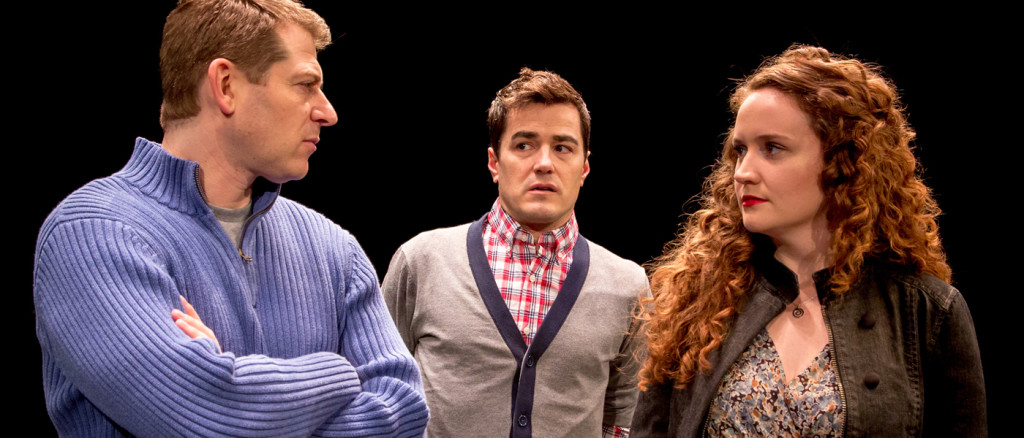Cockfight was the title a squeamish New York Times used two years ago when Mike Bartlett’s award-winning dark comedy Cock opened. In shunning the title used for the earlier London opening, the Gray Lady was on to something. Consider the starkly bare stage from set designer David L. Arsenault that director Margarett Perry has chosen for the production at Ithaca’s Kitchen Theatre Company, running through Sunday, March 9. There’s not a single prop, not even a strip of masking tape on the floor.
Instead, Arsenault has put a new range of seats on the far side of the performance area, creating not just theater-in-the-round but, visually, an arena. In program notes for the show, playwright Bartlett says the physical dynamics of the 90-minute drama were partially inspired by a visit to Mexico where he witnessed the violent aggressions of angry fowls in a cockpit. And that’s what this looks like.
Bartlett’s preferred title, Cock, is a word with two levels of meaning in Britain. It certainly does denote the male member, and is used in that definition in the dialogue here. It may also be a shorthand reference to the phrase “cock and bull story,” implying exaggeration and empty hot air. So that’s what’s coming. Cock portrays aggressive rhetorical posturing on the subjects of sex and identity around a love triangle. All that, but no more tenderness than you’d find at any cockfight.
In the first scene we encounter slight and cringing John (Vince Gatton), who admits to his long-term boyfriend, the tall, forthright and athletic M (Nick Hetherington), that he has discovered the joys of female company. Understandably, M does not take the news well and bristles with resentful jealousy. It’s bad enough to have any rival, but M is more deeply unhappy that it’s a she. In a faltering attempt to console M for the wound, John offers that’s she’s tall and mannish. “Like Ray Winstone?” M growls.
It’s easy to understand why the two might be breaking apart the way they try to hurt one another. M strikes verbally at John: “Your hands are like satellite dishes at the end of fishing rods.” Less directly, John whines that he sometimes still prefers masturbation to love-making with M. “We are fundamentally different people,” he repeats again and again.
The lovely W is anything but mannish, although she is fairly tall and usually speaks brusquely. And those boots might have been made for stomping as well as walking. Director Perry often has Luz’s W standing with hands on hips, an authority posture we never saw on M. She’s a young divorcee and a classroom assistant. The excitement John and W have in meeting is fueled in part by the pleasurable memory of their recent sexual encounters. When he speaks of her genitalia, he does not use street terms.
As with M, John wishes to encounter again the beauty of W’s body and thus asks her disrobe, which she does. (The actress is fully clothed, as always). Callously, John speaks of his surprise at the amount of W’s body hair. When W asks John to disrobe with her, he also complies. Her test is to see whether his member will rise in response to her immediate presence.
In keeping with the play’s origins, all players speak with the appropriate British accents, equal to those of actor Nick Hetherington, a U.K. native. Despite this there’s an inescapable feeling that playwright Bartlett has been paying close attention to the works of American playwright Edward Albee, especially Who’s Afraid of Virginia Woolf? The difference here is that the male-male verbal sparring is notably more brutal than the male-female jabbing, which can be more indirect and games-playing. We are also inclined to question the honesty of male-female exchanges. John’s pledge of loyalty to W invites our doubt.
These vectors come crashing together in the third sequence, as the three points of the love triangle meet at a tense, joyless birthday party. They are joined by M’s father, F (Daren Kelly), who mucks things up further. F wants to stand up for his bellicose son, understandably, and sparks fly between W and F when she accuses him of being, in effect, a dirty old man, staring at her breasts. F asserts a façade of reasonableness: He cannot come to terms with John’s loving both a man and a woman at the same time, his bisexuality a challenge when homosexuality has become, in Britain, if not Arizona, a part of the landscape.
Cock is a tautly directed, electric dark comedy that never gives you a minute to catch your breath. Both Luz and Hetherington are pugnacious and winning in their own ways. Vince Gatton’s John is a harder role to pull off, the weakling who enjoys a magnetism for the powerful. Although playwright Bartlett may never have seen it, Gatton’s John evokes Tom Conti’s schlumpy librarian in the 1970s-era comedy trilogy The Norman Conquests. There he was the anti-hero the girls cannot resist. This time the anti-hero draws both girl and boy.



![SyracuseStage-1400x600px[1]](http://syracusenewtimes.com/wp-content/uploads/2014/02/SyracuseStage-1400x600px1-1024x438.jpg)